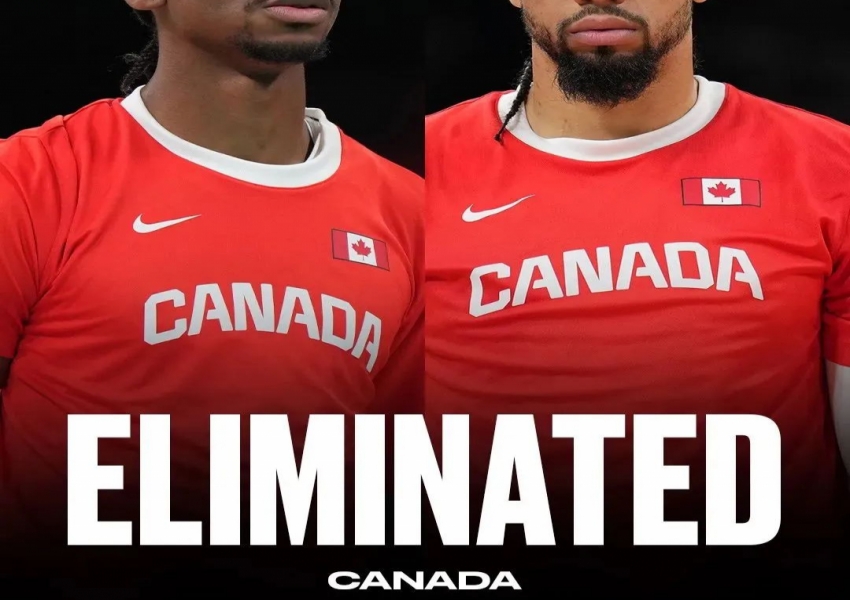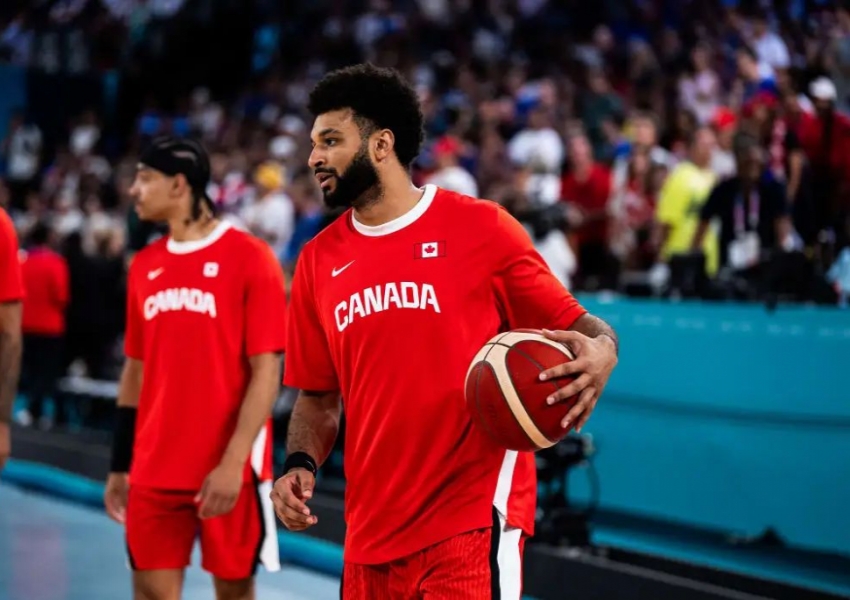Dragons and Phoenixes Fall Short! Shai Can’t Carry Canada, France Advances Amid Controversy
The Olympic quarterfinals brought a surprising twist as the French national basketball team defeated Canada 82-73, advancing to the semifinals in a game that left many fans and analysts shocked. Heading into this matchup, the general consensus was that Canada held the upper hand. With the likes of Shai Gilgeous-Alexander and RJ Barrett leading the charge, Canada was expected to overpower a French team that had looked lackluster throughout the tournament. However, France defied the odds, and some are now questioning whether the home-court advantage played a significant role in their victory.

Pre-Game Expectations: Canada on Top
Before the game, the narrative surrounding the French team was far from optimistic. Coming off a disappointing 2023 FIBA World Cup where they failed to advance past the group stage, France entered the Olympics with a shaky reputation. Their preparation games had been underwhelming, with a 2-4 record in the lead-up to the tournament. They only managed to make it to the quarterfinals thanks to a favorable group draw, narrowly defeating Brazil and Japan, with the latter game requiring an overtime that was mired in controversy due to a questionable foul call that allowed France to stay in the game.

Adding to the turmoil, internal discord within the French camp became public knowledge. Evan Fournier openly disagreed with head coach Vincent Collet’s tactics, and Collet, in turn, criticized Victor Wembanyama for trying to do too much in one-on-one situations. This discord, coupled with France’s underwhelming guard play, led many to believe that Canada, with its explosive backcourt, would have a significant edge.

But as the saying goes, “that’s why they play the games.”
France’s Dominant Start
From the opening tip, France came out with an intensity and focus that caught Canada off guard. The French team opened with a 19-5 run, setting the tone for the rest of the game. By the end of the first quarter, France had built a 23-10 lead, and they continued to extend the margin, reaching a 19-point advantage early in the third quarter at 48-29. This 19-point gap was the largest of the game, and although Canada made several attempts to close the deficit, France always had an answer.
Canada’s struggles to close the gap were evident. Every time they seemed to gain momentum, France found a way to respond, maintaining their lead until the final buzzer. It was a stunning reversal of expectations, especially given how vulnerable France had appeared leading up to this matchup.
A French Team of Unlikely Heroes
When most people think of the French national basketball team, they immediately picture Wembanyama and Rudy Gobert as the cornerstones of the squad. However, France’s victory against Canada didn’t follow the expected script. Coach Collet made a bold decision to limit Gobert’s minutes, likely in response to Canada’s superior guard play. Gobert played just under four minutes, scored no points, and grabbed only one rebound. It was an astonishingly quiet night for the three-time NBA Defensive Player of the Year.
Wembanyama, who had been the focal point of France’s offense in previous games, also saw his role diminished. He struggled to find his rhythm, shooting just 2-for-10 from the field, including 0-for-6 from beyond the arc. He finished with a modest 7 points, but contributed in other areas, grabbing 11 rebounds and dishing out 5 assists while also recording 3 steals. Despite his off night offensively, Wembanyama’s willingness to do the dirty work helped keep France in control.
Nicolas Batum, another of France’s NBA veterans, was also uncharacteristically quiet. He played the most minutes of any player on the team (34), but attempted only one shot, which he missed, finishing with no points, 4 rebounds, and 3 assists. With their star players underperforming, France’s victory was powered by a trio of non-NBA players who stepped up in a big way:
- Guerschon Yabusele: The former Boston Celtics forward led all scorers with 22 points, shooting 9-for-16 from the field and 2-for-4 from three. He also added 5 rebounds.
- Elie Okobo: Okobo was lethal from beyond the arc, hitting 4 of his 5 three-point attempts. He finished with 20 points and 3 rebounds, providing the outside shooting that France desperately needed.
- Matthias Lessort: Lessort was a force in the paint, scoring 13 points on just 3 field goal attempts but making 9 of his 14 free throws. He also contributed 5 rebounds.
France’s strategy was simple yet effective: exploit Canada’s lack of interior presence and size mismatches. Yabusele and Lessort took advantage of Canada’s smaller lineup, drawing fouls and converting from the free-throw line. The two combined to shoot 23 free throws, making 17, which was nearly as many as Canada’s entire team (25 attempts).
Evan Fournier’s Redemption
One of the biggest storylines leading up to this game was the poor performance of Evan Fournier in the group stage. The veteran guard, who has been a mainstay for France in international competitions, was averaging just 10.3 points per game on 32.1% shooting. However, Fournier found his groove when it mattered most.
In the first three quarters against Canada, Fournier struggled once again, making just 1 of 4 shots for 3 points. But in the final minutes of the fourth quarter, Fournier transformed into the “French Jordan,” scoring 12 of his 15 points down the stretch. His clutch shooting included a critical three-pointer that stopped Canada’s run when they had closed the gap to just 5 points, a floater that extended the lead, and a miraculous half-court heave as the shot clock expired. Fournier also went a perfect 4-for-4 from the free-throw line in the closing moments, ensuring that France’s lead remained intact.
This performance was by far Fournier’s best of the tournament, and it came at a crucial time for France. With Wembanyama and Gobert largely neutralized, Fournier’s late-game heroics were essential in securing the win.
Canada’s Disappointing Exit
On the other side, Shai Gilgeous-Alexander did everything he could to keep Canada in the game. The NBA All-Star played 37 minutes, scoring 27 points on 9-of-19 shooting while also adding 5 rebounds and 4 assists. He carried the team through the second and third quarters, scoring 20 of his points during that span, and was the only consistent offensive threat for Canada.
RJ Barrett also put in a solid performance, scoring 16 points on 6-of-10 shooting, including 2-for-4 from three. However, like Gilgeous-Alexander, Barrett’s contributions were not enough to overcome the deficit. He scored 10 of his points in the fourth quarter, but his late surge came too late, as he had managed just 6 points through the first three quarters.
While Gilgeous-Alexander and Barrett showed why they are considered among the best FIBA players, Canada’s downfall was largely due to the lackluster performances of their other key players. Dillon Brooks, who had been averaging 14.3 points per game in the group stage on impressive shooting splits (50% from the field, 60% from three, and 90% from the free-throw line), went ice cold against France. He shot just 1-for-9 from the field, scoring a mere 2 points, and was a non-factor offensively.
Jamal Murray’s struggles continued as well. The Denver Nuggets star had been underwhelming throughout the tournament, averaging just 5.7 points per game on 33.3% shooting. Unfortunately for Canada, his poor form persisted in the quarterfinals, where he shot 3-for-13 from the field and 1-for-4 from three, finishing with just 7 points.
To make matters worse, Andrew Nembhard, who had been a revelation during the group stage, failed to make an impact in the quarterfinals. Despite playing 15 minutes, he did not attempt a single shot and finished with zero points.
Canada’s lack of production from its supporting cast was glaring, especially when compared to France’s role players who stepped up in the absence of big contributions from their stars. Additionally, Canada’s interior defense was exposed, as they were outmuscled and outplayed by France’s physical frontline.
Controversial Officiating?
Another talking point from this game was the officiating. France attempted 42 free throws compared to Canada’s 25, leading to speculation that the referees may have favored the home team. While some of the calls were borderline, the disparity in free throw attempts certainly raised eyebrows, especially considering the importance of the game. Whether or not the officiating played a decisive role, it’s clear that France’s ability to draw fouls and capitalize on them was a key factor in their victory.
What’s Next for France?
France now advances to the semifinals, where they will face Germany, a team that has been on a tear in international play. Germany is riding a 13-game winning streak in major tournaments, including victories over France in both a pre-Olympic exhibition game and their final group stage match at the Olympics. In those games, France struggled mightily, particularly in their most recent encounter, where they trailed by as many as 24 points.
Germany boasts a balanced attack with Dennis Schröder leading the backcourt and the Wagner brothers anchoring the frontcourt. Given their recent dominance, Germany will be the favorites heading into the semifinal matchup. However, after defying the odds against Canada, France has shown that they are capable of pulling off another upset.
The question remains: Can France continue to punch above their weight and reach the Olympic final, or will Germany’s winning streak continue? With Wembanyama, Fournier, and their role players finding ways to win, it’s a matchup that promises to be as unpredictable as it is exciting.
Copyright Statement:
Author: focusnba
Source: FocusNBA
The copyright of this article belongs to the author. Reproduction is not allowed without permission.
Recommended Blog
- End of the Road! The Worst-Case Scenario Unfolds: What Happened to China's Women's Basketball Team?
- China Men's Basketball Announces 20-Man Training Squad! Is Lin Wei Being Blacklisted? The Nation's Top Shooting Guard Left Out...
- Trail Blazers Announce! Cui Yongxi Ready for the NBA Again! China's Top Forward Shows His Talent...
- Plus-Minus +30! 5 Steals and 2 Blocks! Leaving Jaylen Brown Behind Was the Right Call!
- Sudden Retirement! At 34, Gordon Hayward Prioritizes Life Over Basketball
- Scoring Big: Zhang Yuqi's New Boyfriend is CBA's 6th Pick Liu Ziqi
- NBA Drama Unfolds! Trade Butler ASAP: The Heat’s Ruthlessness Knows No Bounds
- Unbelievable! The Truth Behind Lin Wei's Ban from Chinese Basketball - Worse Than Fighting
- $175 Million Over Five Years! Changing Times in the NBA as Quickley Secures a Massive Contract
- The Mavericks' First Big Move of the Summer: A Masterstroke Without Sacrificing a First-Round Pick?
Hot Blog
- FMVP Fifth?! How 33-Year-Old T.J. McConnell Became a Finals Force in the Shadows
- $320 Million Over Five Years: Is 28-Year-Old Devin Booker Really Worth It?
- G6 Meltdown: The Pacers Scored Just 108—So How Did the Thunder Lose by 30?
- The SGA Stopper: Just How Good Has Andrew Nembhard Been in the NBA Finals?
- The Five-Minute Collapse: From G5 Villain to G6 Redeemer—Can Nembhard Bounce Back?
- Not Even Durant Can Get Him: Why 28-Year-Old Ivica Zubac Is Now Untouchable in LA
- Two Second-Round Picks? Obi Toppin Is Writing His Own Playoff Legacy in Indiana
- $229 Million Over Four Years! Is 27-Year-Old De'Aaron Fox Worth It?
- The Ultimate Underdog: How T.J. McConnell Became the Unsung Hero of This Year’s NBA Finals